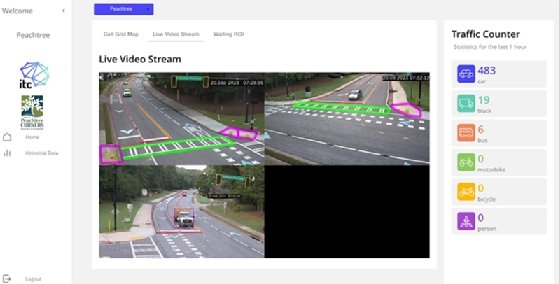
elenabsl - Adobe
Peachtree Corners smart city gets traffic management solution into gear
Pioneer US smart city teams with Intelligent Traffic Control for vehicle control system that can be applied to existing infrastructure to measure traffic and predict and mitigate congestion for safer, more sustainable and efficient travel experience
Just after Siemens joined the smart city consortium to bring 5G electrification expertise with charging stations for electric vehicles and infrastructure using T-Mobile’s 5G network, US smart city Peachtree Corners – one of the first powered by real-world connected infrastructure and 5G – has announced a partnership with Israeli startup Intelligent Traffic Control (ITC), providing a software solution to manage travel within the city’s communications network.
Part of the Curiosity Lab ecosystem and based at the heart of what is known as “Silicon Orchard” in the Metro Atlanta region, Peachtree Corners comprises a municipality that is home to more than 45,000 residents, 45,000 jobs and an innovation hub claimed to house some of the world’s most disruptive technology companies.
Peachtree Corners makes claim to being the first US smart city to be powered by 5G and city-owned connected infrastructure, and the first to have deployed a full cellular vehicle-to-everything (C-V2X) system within its “city street of the future”.
With its infrastructure, the city is said to serve as a model for how government and private industry can collaborate to create a better future for society and business. From the world’s first deployment of teleoperated e-scooters to fully autonomous shuttles being used by residents, and from a solar roadway to the largest electric vehicle fast-charging hub in the region, Peachtree Corners aims to develop future internet of things (IoT) and sustainable technologies.
Part of the latter is an ITC solution that, in its first deployment in the US, will see use at traffic intersections for demonstrations and testing, be applied to existing traffic infrastructure to measure traffic, and predict and mitigate congestion before it occurs for a more safe, sustainable and efficient travel experience.
ITC’s software connects to existing traffic cameras and uses computer vision analysis to accurately identify all road objects and collect data including speed, acceleration, traffic flow, distance, pedestrian activity and more, while complying with privacy regulations such as hiding licence plates and faces.
Using proprietary machine learning models, the data is then used to create a traffic model that highlights patterns of each intersection or corridor with the ability to connect across a grid of intersections and create one holistic image. ITC is also predicting traffic patterns in real time based on historic data, enabling cities to have proactive and adaptive control of traffic congestion.

In addition to uncovering patterns, ITC’s solution will also create traffic simulations across intersections and corridors where the software is deployed. Here, traffic controllers and city managers will be able to see real-time object-driven visualisation and simulation with a geographic overlay, and to create countless theoretical traffic scenarios for the software to solve. Through its proprietary algorithms, ITC’s software can also manage traffic based on a city’s specific goals, whether that be to limit carbon emissions and improve sustainability, or provide general traffic management, prioritise pedestrians or public transit, and more.
“According to recent studies, more than 40% of traffic accidents occur in intersections, and congestion accounts for 25% of car greenhouse gas emissions, with the average driver spending three days per year stuck in traffic,” said Brandon Branham, Curiosity Lab executive director.
“This cost-effective traffic solution is going to be a game-changer for cities across the US. ITC’s solution gives city managers and traffic engineers the affordable tools to make our roadways safer, more efficient and thus more sustainable for everyone on the road,” added Branham. “We will be able to manage intersections in real time and can easily download a traffic report and adapt traffic signal patterns remotely, which is a huge advantage for city managers when there are major wrecks, community events and sudden surges in traffic. As a city, we are excited to witness how ITC continues to improve our residents’ daily driving experience.”
ITC’s software not only learns and adapts traffic signals and patterns in real time, but also has the capability to manage traffic to prioritise certain categories of road users, according to co-founder and chief technology officer Dvir Kenig.
“This allows cities to manage each intersection or corridor differently based on the type of traffic they are seeing and/or time of day. If an intersection regularly has heavy pedestrian traffic, our solution can prioritise this category and will develop models for pedestrian tendencies across wait time, how long it takes to cross the street, etc,” said Kenig.
Read more about smart cities
- Berlin ranked top smart city in Europe in 2023: Study finds German capital is the smart city centre of Europe and that in addition to connected lifestyles, such places are driving strong emissions savings in across the continent CO2e Savings set to reach 247 MMT.
- UK towns and cities gain funding to trial smart connectivity: Six areas across the UK awarded funding delivered through Smart Infrastructure Pilots Programme to test smart street lamps that can house electric vehicle charging hubs and boost wireless coverage.
- Curiosity Lab brings in the future of 5G electrification for pioneer smart city: Leader in charging solutions brings the latest in electric vehicle infrastructure, based on T-Mobile 5G technology to ensure constant connectivity in the pioneering US smart city of Peachtree Corners.
- Shanghai ranked world’s top smart city for 2023: Research shows savings from smart city deployments reaching $249bn globally, with Asia and North America dominating list of top switched-on urban environments.








